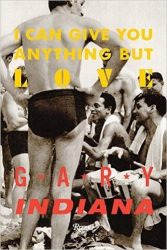 I Can Give You Anything But Love
I Can Give You Anything But Love
by Gary Indiana
Published by Rizzoli Ex Libris
Published September 8, 2015
History (memoir)
240 pgs. • Find on Amazon.com
Reviewed by Stephen O. Murray
October 31, 2015
I Can Give You Anything But Love by Gary Indiana (who was born in 1950) is a very disjointed memoir, alternating between a present-tense tales of shortages of everything except of pingas listas (ready to fuck anything, if not a vagina, an anus, if not an anus a grapefruit, according to Indiana). With police targeting anyone who looked local who was in the company of someone who looked foreign (pale, especially if notably older than the local) the paradise of male penetrators was evaporating as it became legal for Americans to spend money in Cuba.
Indiana’s daily dose of gargantuan penis was attached to a deaf-mute, whose condition was perfection for someone who does not want to have any relationship beyond sex with his masculine partners (Abdul, a former regular inseminator talked and sometimes wanted to be treated as a friend…). Not that he is the only person (prototypically male, though more prototypically activo than pasivo, like him) who revels in meeting of penis and orifice between persons whose minds don’t meet or communicate about anything except price for servicing.
There is little (other then memories of the first three boys he fellated) about growing up in New Hampshire. Indiana candidly writes: “I’m old enough to justify writing about my history, but too old to remember much of it.” About his life in Derry, NH, others can provide no help: “The few survivors from that place and period [or later, other ones!] don’t remember the same things I do, or remember them all differently.”
He wrote down a lot (the endpapers reproduce some handwritten notebook entries), but does not quote from what became de facto AIDS mémoires.
Beyond the adolescent blowjobs he provided, Indiana recalls the drug-addled squalor of hippie porn-makers in the Haight, his time working in a legal aid office in Watts while living in a crumbling apartment building in Westwood owned by Fred MacMurray, and moonlighting in a theater showing the dregs of international cinema. The latter prompts form Indiana perhaps the only positive comment about celebrities: good treatment (not just tips) from Robert Wagner and Natalie Wood when they bought stuff from the theater’s concession stand.
Although Indiana has lived in Lower East Side Manhattan for decades, there is basically nothing about NYC/living in NYC in the book. There is an extended (pp. 116–22) expression of irritation at his former friend Susan Sontag’s impossibility. It does not fit with my own (admittedly more limited) experience with Sontag, but presents a view that while very jaundices is not implausible.
He does not write about the serial killers he researched and wrote about, but savages some other culture-creators, e.g.:
Hemingway is a lousy writer. A phony writer. A writer whose books are a tissue of falsehoods and moronic clichés of masculinity. A mendacious, ridiculous, deluded buffoon of a writer intoxicated by fame to the point of writing drivel.
I disliked David Lynch immensely. His stories were humorless and boring. His smarmy air as he stirred his Postum was even creepier than his movie.
Joan Didion and Charles Bukowski also come in for some abuse from Indiana.
Though often put off by the style and the substance and the refusal to address the bases of his literary work (or to caption the stray photos that are plopped in with no obvious connection to the surrounding text), I kept turning the pages of the literally scabrous book. It does seem to fit (from the buyer’s perspective) with the portrayal (from the sellers’ perspective) of short-term male sex work in Havana in Noella Stout’s ethnography After Love: Queer Intimacy and Erotic Economics in Post-Soviet Cuba (Duke University Press, 2014).
Also see my report on a 1997 San Francisco gay bookstore appearance here.
31 October 2015
©2015, Stephen O. Murray

